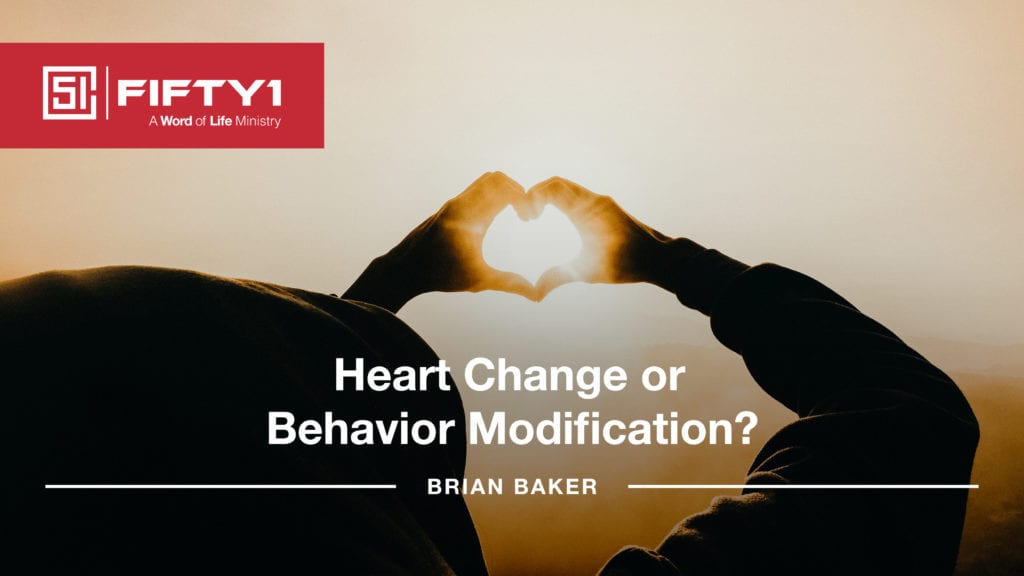About 3 years ago, I had Dr. Tedd Tripp on the Multiply! Youth Ministry Podcast. Our discussion is one I regularly go back to because of the emphasis on heart change instead of behavior modification. We talked about a couple of specific areas as this emphasis on heart change relates to youth ministry. In this article, I want to share some thoughts from that conversation and how it impacts our ministry.
Teaching
It is easy, even when teaching the Bible, to make morality the focus of our application. However, it is important we remember that a change in behavior is not our ultimate goal–a change of the heart is where we ought to be focused. Jesus talks in Matthew 5 about both murder and adultery, but in doing so He says that it is not just the outward act that makes us guilty. When we hate our brother in our heart or look at a woman with lust, we are also guilty. He makes the focus inward. Proverbs 4:23 (NLT) says, “Guard your heart above all else, for it determines the course of your life.” The heart is the core of who we are. Our heart is not just our emotions–it is where we keep things, it is where we think. In Matthew 6:21 (ESV) Jesus says, “For where your treasure is, there your heart will be also.” The only way to experience true and lasting change is through the heart. When our thinking (heart) is right, our actions will follow. Yes, behavior is important, but behavior is just a symptom of a deeper issue going on in the heart.
One-on-One or Small Groups
When dealing with students on a more personal level, it is important that we ask good questions. This is especially true when a student has done something wrong or is struggling in a specific area. Instead of making accusations, start your questions with “Help me understand…” For example, “Help me understand why you are posting inappropriate pics” If you make accusations like, “What is your problem, those posts are terribly inappropriate,” you will more than likely be met with resistance. The walls will go up immediately. When you say, “Help me understand…” you are inviting them to reflect on the ‘why’ of what they posted. It might be an identity crisis, major insecurity, peer pressure, or a combination of all these and more. Telling them to stop posting only deals with the symptom. Figuring out the ‘why’ will help you get to the root of the issue, and, from there, you can address it.
The difference in outcome between a focus on behavior modification and heart transformation is starkly clear. Behavior modification can easily lead to having proud, self-righteous students who are judgmental and do not sense a need for God. Those who are discipled in a way that focuses on transformation of the heart learn to understand themselves and their heart attitudes, and they tend to have a greater sense of how desperately they need the grace of God in their life.
If you just want to have ‘good kids,’ then go in the direction of behavior modification. If you want to develop students who experience an inward transformation that only God can give, then go for the heart.
Brian has been in youth ministry for 23 years. He is passionate about communicating truth to young people and the leaders that work with them. Brian loves to play, watch and talk about all kinds of sports. He and his wife Lynn have three awesome teenagers and live in upstate, NY.


3 thoughts on “Heart Change or Behavior Modification?”
Thanks for sharing this. My husband is a pastor. This is a Huge problem especially with the older believers. They judge the outward appearances of the young people. We are seeing so many young people leave churches and declare they are going through the deconstruction of their faith. It is so harmful and causes spiritual harm.
Great point Kristy. It is easy to get off track and start focusing more on morality than true heart transformation. We continually have to preach the gospel to ourselves as a reminder of all that Jesus had done for us.
Loved this information about behavior vs heart transformation. It’s not the striving to live by the letter of the law which enforces to the limit allowing no excuses. But living by the spirit (heart) of the law which takes in account every circumstance granting mercy when warranted.